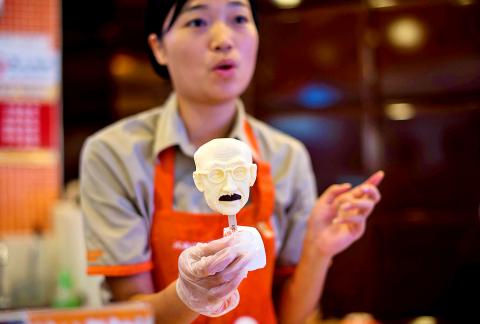An ice cream chain in China’s commercial hub of Shanghai is offering a lickable likeness of the head of executed Japanese war criminal Hideki Tojo to mark the 70th anniversary of the end of World War II.
Iceason parlours are selling ice cream bars on a stick with the image of Tojo, a former Japanese army general and prime minister, in a campaign with the slogan “10,000 people together eat the Japanese war criminal.”
An advertising poster displayed at one store in central Shanghai showed a chocolate Tojo, complete with glasses and a moustache, with the words: “Never forget national humiliation.”

Photo: AFP
Another store in Shanghai’s financial district offered five Tojo flavors: vanilla, blueberry, mocha, mango and tiramisu. However, it had few takers for the ice cream, priced at 30 yuan (US$4.7), even during the lunch hour.
Customers who buy 50 yuan-worth of ice cream could get a free Tojo bar if they used the online payment service of Chinese Internet giant Alibaba, store employees said.
Beijing is to commemorate the 70th anniversary of the end of World War II with a huge military parade through Tiananmen Square today, amid tense ties with Tokyo over territorial claims and wartime history.
“It’s just ice cream,” one online commentator said of the Tojo bars. “There’s no reason why you can’t eat it.”
Another declined to partake.
“It’s hilarious, but I have always thought that phase of history isn’t fit for consumption,” they said.

‘UNUSUAL EVENT’: The Australian defense minister said that the Chinese navy task group was entitled to be where it was, but Australia would be watching it closely The Australian and New Zealand militaries were monitoring three Chinese warships moving unusually far south along Australia’s east coast on an unknown mission, officials said yesterday. The Australian government a week ago said that the warships had traveled through Southeast Asia and the Coral Sea, and were approaching northeast Australia. Australian Minister for Defence Richard Marles yesterday said that the Chinese ships — the Hengyang naval frigate, the Zunyi cruiser and the Weishanhu replenishment vessel — were “off the east coast of Australia.” Defense officials did not respond to a request for comment on a Financial Times report that the task group from

DEFENSE UPHEAVAL: Trump was also to remove the first woman to lead a military service, as well as the judge advocates general for the army, navy and air force US President Donald Trump on Friday fired the chairman of the Joint Chiefs of Staff, Air Force General C.Q. Brown, and pushed out five other admirals and generals in an unprecedented shake-up of US military leadership. Trump wrote in a post on Truth Social that he would nominate former lieutenant general Dan “Razin” Caine to succeed Brown, breaking with tradition by pulling someone out of retirement for the first time to become the top military officer. The president would also replace the head of the US Navy, a position held by Admiral Lisa Franchetti, the first woman to lead a military service,

Four decades after they were forced apart, US-raised Adamary Garcia and her birth mother on Saturday fell into each other’s arms at the airport in Santiago, Chile. Without speaking, they embraced tearfully: A rare reunification for one the thousands of Chileans taken from their mothers as babies and given up for adoption abroad. “The worst is over,” Edita Bizama, 64, said as she beheld her daughter for the first time since her birth 41 years ago. Garcia had flown to Santiago with four other women born in Chile and adopted in the US. Reports have estimated there were 20,000 such cases from 1950 to

CONFIDENT ON DEAL: ‘Ukraine wants a seat at the table, but wouldn’t the people of Ukraine have a say? It’s been a long time since an election, the US president said US President Donald Trump on Tuesday criticized Ukrainian President Volodymyr Zelenskiy and added that he was more confident of a deal to end the war after US-Russia talks. Trump increased pressure on Zelenskiy to hold elections and chided him for complaining about being frozen out of talks in Saudi Arabia. The US president also suggested that he could meet Russian President Vladimir Putin before the end of the month as Washington overhauls its stance toward Russia. “I’m very disappointed, I hear that they’re upset about not having a seat,” Trump told reporters at his Mar-a-Lago resort in Florida when asked about the Ukrainian